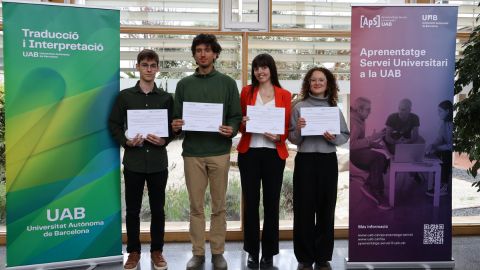The 5th SL Seminar at the UAB attracts almost 200 participants

On 25 April, the Faculty of Translation and Interpreting hosted the 5th Service-Learning Seminar at the Universitat Autònoma de Barcelona (UAB), with almost 200 participants, including teachers, students and organisations affiliated to the UAB Service-Learning. Students Jordi Dot (Philosophy), Jordi Cano (Environmental Biology), Marina Picó (Food Science and Technology) and Sandra Amigó (Criminology) were awarded for the best final service-learning projects by discipline.
29/04/2024
Service-Learning (SL) is an educational proposal in which students receive training through participation in a project aimed at solving a real need of a community, thus improving people's living conditions or the quality of the environment.
Engaging in a Service-Learning offers students the opportunity to immerse themselves in an experience that entails learning related to their academic curriculum, personal skill development, and real community service.
On April 25th, the Faculty of Translation and Interpreting at the Universitat Autònoma de Barcelona hosted the 5th Service-Learning Day with the participation of nearly 200 individuals, including faculty, students, and organisations involved in Service-Learning at UAB.
This fifth edition of the Service-Learning Day at UAB included three different activities. It commenced with an inaugural round table and the accolade ceremony for outstanding Final Degree Projects executed with Service-Learning methodology. Subsequently, a collaborative session aimed at nurturing Service-Learning projects ensued, culminating in a fair featuring diverse booths facilitating networking opportunities between students, faculty, and third-sector entities, fostering the inception of novel Service-Learning initiatives.
Tatiana Rovira, Vice Rector for Studies and Quality, and Olga Torres, Dean of the Faculty of Translation and Interpreting, warmly welcomed the diverse audience gathered to open the event.
Eva Castells, a distinguished professor from the Faculty of Veterinary Medicine, helmed an engaging round table discussion centred on the sustainability of faculty-organisation partnerships and their consequential impact on the quality of Service-Learning projects.
The panel boasted a blend of voices, including representatives from local organisations with a history of fruitful collaboration on Service-Learning projects, such as Anna Farrés, director of the Pla de l'Avellà Primary and Secondary School in Cabrera de Mar, and Irene Fitera, a dedicated social services technician at the Corbera de Llobregat Town Hall. Regarding the teaching staff, participants included Albert Casals and Cristina Gonzàlez from the Faculty of Education Sciences, as well as Ana Barajas and Sílvia Edo from the Faculty of Psychology.
Once the roundtable discussion concluded, the spotlight turned to the presentation of the 3rd edition of the Awards for the Best Bachelor’s Degree Final projects using the Service-Learning methodology at UAB, completed last academic year. In this latest edition, 11 projects from 8 faculties of UAB were honoured, carried out in collaboration with various local entities and institutions such as museums, city councils, schools, and associations, among others.
Among the institutions involved in the awarded graduation projects were the Catalan Commission for Refugee Aid, the Rubí Town Hall, Arcàdia Can Batlló, the Quatre Camins Prison, Actuavallès, the Grup de Natura Freixe of Sebes and Flix Meander Wildlife Nature Reserve, CHAPTER2 and the Bellpuig Community Project. The list of awardees can be found here.
Four projects were singled out from among these works, one for each field of study in which UAB classifies its programs, and they were presented by the Vice-Rector for Studies and Quality, Tatiana Rovira, and the Director of FAS, Jordi Prat.
Students Jordi Dot (Philosophy), Jordi Cano (Environmental Biology), Marina Picó (Food Science and Technology), and Sandra Amigó (Criminology) clinched the award for the best Service-Learning Bachelor’s Degree Final Projects in their respective fields of study.
In the field of Arts and Humanities, the award went to the project “En el si del testimoni: resignificació de l'estatut de la veritat de la figura del testimoni per a la transformació social i la justícia epistèmica” [Within the testimony: redefining the status of truth in the figure of testimony for social transformation and epistemic justice], by Philosophy student Jordi Dot Serrat, supervised by Begonya Sáez Tajafuerce and carried out in collaboration with the Museum of Rural Life.
In the field of Biosciences, Sciences and Technologies, the winning project was “Gestió de plagues de corcs marins fent ús d'un recobriment plàstic: cas pràctic al Museu de la Pesca de Palamós” [Management of shipworms infestation using a plastic coating: case study at the Palamós Fishing Museum], by Environmental Biology student Jordi Cano Serra. It was supervised by Anna Soler Membrives and carried out in collaboration with the Palamós Fishing Museum.
In the field of Health Sciences, the project by Food Science and Technology student Marina Picó Llamas on acrylamide in food, carried out with INS Ribot i Serra de Sabadell, a high-complexity centre, was awarded. The project was supervised by Professor Eva Castells Caballé.
Lastly, in the field of Social and Legal Sciences, Criminology student Sandra Amigó Trujillo won the award with the final degree project " Programa CrimiCEHa. Programa contra el acoso escolar” [CrimiCEHa Program. Program against school bullying] supervised by Professor Esther de la Encarnación Ordóñez and conducted with the Mare de Déu de la Mercè School in Sant Feliu de Llobregat.
After the awards ceremony, the session for co-creation of projects using the Service-Learning methodology commenced. Participants from various entities and faculty members collaborated, grouped into four themes based on their field of knowledge and action: health and vulnerability, sustainability and the environment, global justice, and education and training. The aim of the activity was to share strategies for developing a Service-Learning project, while establishing a communication channel among attendees for the development of future projects using the Service-Learning methodology.
Finally, around midday, a fair of entities was organised, with stands set up outside, open to the participation of the entire university community. Both faculty and students could visit any of the 13 entities that set up a stand to share visions, experiences, and perhaps future bachelor’s degree Final Projects using the Service-Learning methodology.